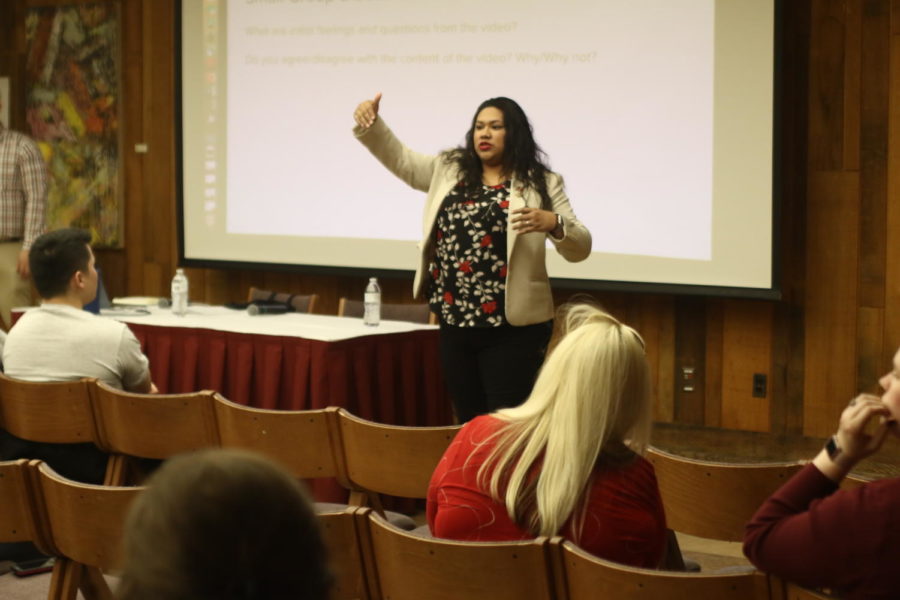3:10 to 4 p.m.: Changing the conversation: I am not a minority
Chris Jorgensen/Iowa State Daily
Maria L. Espina, graduate research assistant, leads a small group conversation during a session titled “I am not a Minority” during the ISCORE conference Friday.
March 1, 2019
As the 2019 ISCORE conference came to a close, doctoral student in the school of education Maria L. Espina, and Undergraduate Program Coordinator for Science Bound Brian Le, led the session, ‘Changing the conversation: I am not a minority.’
‘What we want to do is really change … that word minority and take it out of context and [understand] where the word comes from and really [understand] what that means for people of color when they’re considered a minority and the implications that has for students, especially here at Iowa State,” Espina said.
The session was not just a presentation but served as an opportunity for audience members to address questions they had not had the opportunity to ask and to hear the perspectives of others on what the world minority means to them.
“It’s more of a very interactive session where they’re talking amongst each other and learning from one another, rather than us lecturing at them,” Le said.
To begin the session, Espina acknowledged that everyone in the audience was coming into this conversation with their own understanding and opinions of the word minority. Before going any further, Le led the attendees in creating ground rules to create a truly inclusive space that everyone would be comfortable with.
Everyone in attendance was asked to participate in defining what minority means to them. The entries were then projected anonymously on the screen for participants to read and analyze. Some of the words included majority, group, people, representation, non-white and belittled.
“We hope to have that collaborative, engaged conversation around this terminology because some people might prefer the word minority, so we want to learn with each other and for each other to be able to provide a space to have that discussion,” Espina said.
Espina continued with a brief history of the word minority, its origins and how it came to be used in the way that it is in today’s society, followed by a video highlighting how the word minority is used in a political sense.
Attendees then broke off into small groups to discuss their reactions to the video and how it made them feel. Groups then shared what they had discussed, with topics such as diversity, equality and equity being mentioned.
“I think it’s interesting highlighting different people’s experiences here, and obviously I can’t relate first hand,” said Sarah Igram, communications specialist for the graduate college. “So, I think it’s important for me to attend these and learn a little bit more about their view from where they sit.”
The session continued as an open conversation for audience members to express their own opinions and experiences regarding the the word minority and the connotations that can come with it.
Lisa Saenthavy, a junior in sociology, shared her experience growing up as a person of color.
“I come from a town where there’s a lot of people of color, different cultures and ethnic groups,” Saenthavy said. “So, with all of that we are the majority of that town, but we are still considered the minorities of the town, so I never really understood the word minority being used because a lot of the minorities I see, is the majority of a lot of things that I’m involved in and just things I see.”
Throughout the 50-minute session many questions and topics arose, but one question on the minds of the audience: what word, if not minority, should they be using?
Espina shared that she personally prefers “student in the margins” or “Mexican American,” or “a person of color,” instead of being referred to as a minority.
“It is hard for generalizable terminology … which makes it very complicated,” Espina said.
Le said he too prefers “people of color,” or “marginalized,” as opposed to “minority.”
“We are not ‘less than’ people, we are not less than anyone else, we are still humans,” Espina said. “As long as you portray a term that humanizes individuals and treats them as humans, I feel like that’s something that we are trying to push more too.”
Espina went on to say there isn’t one answer to the question of what word is best because it depends on the context as well as that specific individuals preference.
“We had a lot of questions, but we didn’t really have any answers at the end of the session, so that’s just something to take away — how do we answer these questions?” Saenthavy said.







